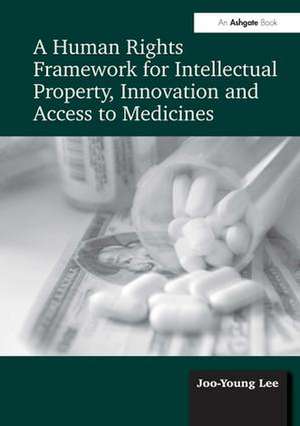A Human Rights Framework for Intellectual Property, Innovation and Access to Medicines
Autor Joo-Young Leeen Limba Engleză Hardback – 28 iun 2015
| Toate formatele și edițiile | Preț | Express |
|---|---|---|
| Paperback (1) | 451.32 lei 6-8 săpt. | |
| Taylor & Francis – 28 iun 2017 | 451.32 lei 6-8 săpt. | |
| Hardback (1) | 1008.35 lei 6-8 săpt. | |
| Taylor & Francis – 28 iun 2015 | 1008.35 lei 6-8 săpt. |
Preț: 1008.35 lei
Preț vechi: 1229.69 lei
-18% Nou
Puncte Express: 1513
Preț estimativ în valută:
192.95€ • 201.96$ • 160.59£
192.95€ • 201.96$ • 160.59£
Carte tipărită la comandă
Livrare economică 31 martie-14 aprilie
Preluare comenzi: 021 569.72.76
Specificații
ISBN-13: 9781472410610
ISBN-10: 1472410610
Pagini: 300
Dimensiuni: 174 x 246 x 26 mm
Greutate: 0.69 kg
Ediția:1
Editura: Taylor & Francis
Colecția Routledge
Locul publicării:Oxford, United Kingdom
ISBN-10: 1472410610
Pagini: 300
Dimensiuni: 174 x 246 x 26 mm
Greutate: 0.69 kg
Ediția:1
Editura: Taylor & Francis
Colecția Routledge
Locul publicării:Oxford, United Kingdom
Notă biografică
Dr Joo-Young Lee is an advisor at the Human Rights Centre at Seoul National University in South Korea. She has published in English on various aspects of international human rights law.
Recenzii
’This book explores one of the most controverted fields of enquiry in international human rights law, but also in the discussion of intellectual property law. The author provides an extraordinarily broad and comprehensive picture of the many issues involved, and in lucid style displays mastery of many of the problems encountered. The study is soundly researched, well-structured and convincingly argued, and will undoubtedly leave its mark on the scientific community, and should influence lawyers, academics, practitioners and treaty-monitoring bodies alike.’ Eibe Riedel, Visiting Professor at the Geneva Academy of Humanitarian Law and Human Rights, Switzerland, and former Swiss Chair of Human Rights ’Intellectual property laws should not impede States’ compliance with their core obligation to ensure universal access to affordable essential medicines. This carefully written book adds a comprehensive human rights framework to international efforts to find the right balance between two different value systems. Warmly recommended.’ Hans V. Hogerzeil, University of Groningen, The Netherlands, and former Director of Essential Medicines and Pharmaceutical Policies, World Health Organization
Cuprins
Introduction; Chapter 1 Historical Overview of Patents; Chapter 2 Perspectives on Patents; Chapter 3 Public Health Safeguards in the TRIPS Agreement; Chapter 4 Human Right to Access to Medicines; Chapter 5 The Right to Science and Culture; Chapter 6 Relationship between TRIPS and International Human Rights Law in the Context of Access to Medicines; Chapter 7 Human Rights, Intellectual Property, Innovation and Access to Medicines; Chapter 101 Conclusion;
Descriere
This study primarily explores whether conflicts between patents and human rights in the context of access to medicines are inevitable, or whether patents can be made to serve human rights. The author argues that it is necessary to have a deepened understanding of each of the two sets of norms that govern this issue, that is, patent law and international human rights law. The chapters investigate the relevant dimensions of patent law and analyse particular human rights bearing upon the issue of intellectual property and access to medicines.
